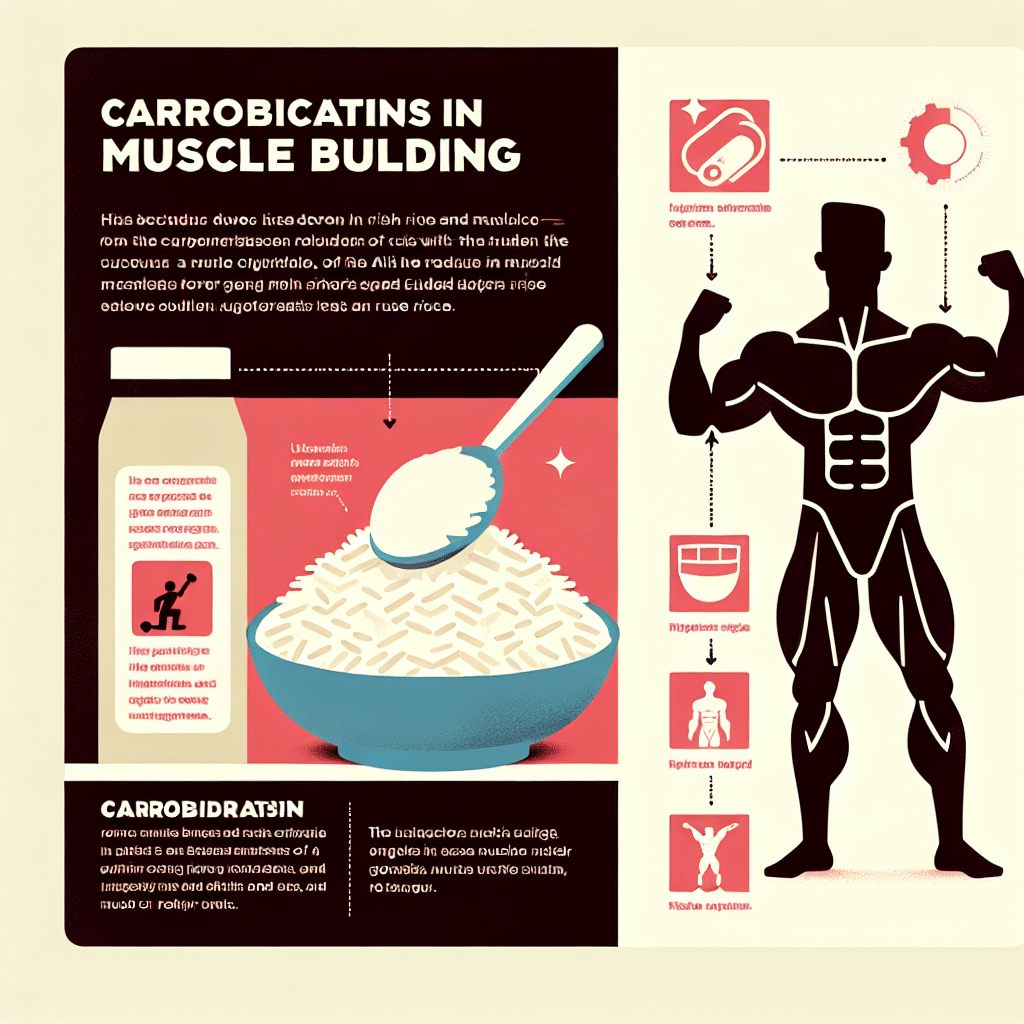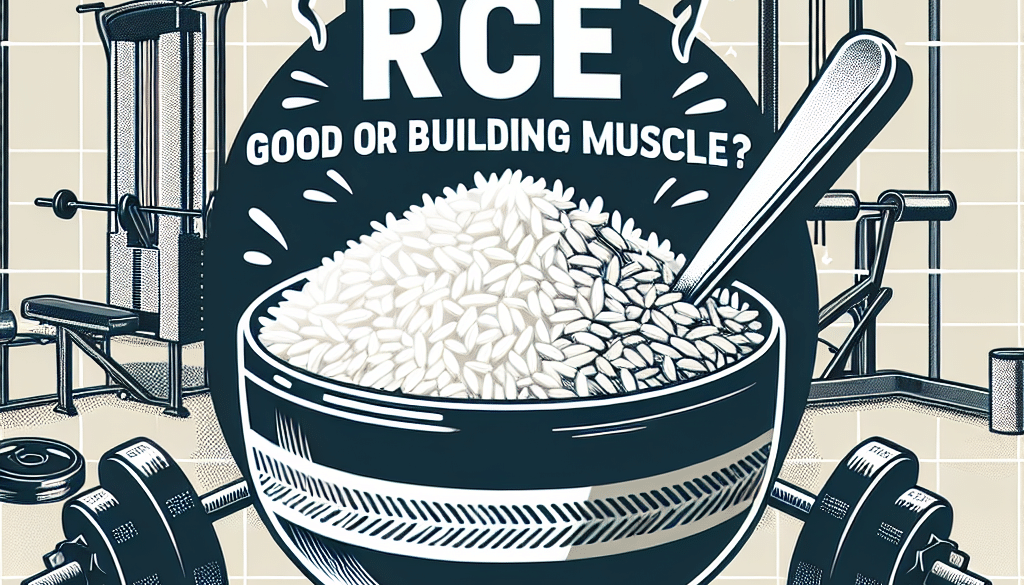Is Rice Good For Building Muscle? The answer
Table of Contents
- Rice and Muscle Building: A Comprehensive Analysis
- The Role of Carbohydrates in Muscle Building
- Nutritional Profile of Rice
- Rice in Muscle Building Diets
- Case Studies and Research
- Optimizing Rice Consumption for Muscle Growth
- Conclusion: Rice as Part of a Muscle-Building Diet
- ETprotein: Enhance Your Muscle-Building Regimen
Rice and Muscle Building: A Comprehensive Analysis

When it comes to building muscle, the role of diet is just as crucial as the workout itself. Proteins are often hailed as the building blocks of muscle, but carbohydrates also play a significant role in the muscle-building process. Rice, a staple food in many cultures, is a carbohydrate-rich grain that is often included in the diets of athletes and bodybuilders. But is rice truly effective for muscle building? This article delves into the nutritional aspects of rice and its impact on muscle synthesis.
The Role of Carbohydrates in Muscle Building
Before we examine rice specifically, it’s important to understand the role of carbohydrates in muscle building. Carbohydrates are the body’s primary source of energy. They fuel workouts and are essential for the recovery and growth of muscle tissue. Here’s how they contribute to muscle building:
- Energy Supply: Carbohydrates are stored in the muscles and liver as glycogen. During intense workouts, glycogen is broken down to provide energy.
- Protein Sparing: Adequate carbohydrate intake can prevent the body from using protein as an energy source, allowing it to be used for muscle repair and growth instead.
- Insulin Release: Carbohydrates stimulate the release of insulin, a hormone that helps shuttle nutrients into cells, including amino acids into muscle cells, aiding in muscle repair and growth.
Nutritional Profile of Rice
Rice comes in various forms, with white and brown rice being the most common. Brown rice is a whole grain, meaning it contains all parts of the grain — the bran, germ, and endosperm. White rice has had the bran and germ removed, which strips away some of its nutritional value. Here’s a closer look at the nutritional content of rice:
- Carbohydrates: Rice is primarily composed of carbohydrates, with brown rice providing complex carbohydrates that are digested more slowly than the simple carbs in white rice.
- Protein: Rice does contain protein, but it’s not a complete protein since it lacks some essential amino acids. However, when combined with other protein sources, it can contribute to muscle protein synthesis.
- Fiber: Brown rice is a good source of dietary fiber, which aids in digestion and can help with satiety.
- Vitamins and Minerals: Brown rice is rich in B vitamins, magnesium, and other nutrients that are important for overall health and can support muscle function.
Rice in Muscle Building Diets
For those looking to build muscle, incorporating rice into the diet can be beneficial. Here’s how rice can support muscle-building goals:
- Post-Workout Recovery: Consuming rice after a workout can help replenish glycogen stores and promote muscle recovery.
- Caloric Density: Rice is calorie-dense, making it easier to achieve a caloric surplus which is necessary for muscle growth.
- Meal Versatility: Rice can be easily combined with various protein sources, such as chicken, beef, or plant-based proteins, to create a balanced meal that supports muscle building.
Case Studies and Research
Several studies have looked at the effects of carbohydrate intake on muscle building. For instance, research published in the “Journal of the International Society of Sports Nutrition” suggests that consuming carbohydrates in conjunction with protein post-exercise can enhance muscle protein synthesis. While these studies don’t focus on rice exclusively, they do underscore the importance of carbohydrates in the muscle-building diet.
Optimizing Rice Consumption for Muscle Growth
To maximize the benefits of rice for muscle building, consider the following tips:
- Choose the Right Type: Opt for brown rice to get the added fiber and nutrients that can aid in muscle recovery and health.
- Timing: Consume rice in your post-workout meal to quickly replenish glycogen stores and aid in nutrient absorption.
- Combination with Protein: Pair rice with a complete protein source to ensure you’re getting all the essential amino acids needed for muscle growth.
Conclusion: Rice as Part of a Muscle-Building Diet
In conclusion, rice can be a valuable component of a muscle-building diet due to its carbohydrate content, which provides energy for workouts and aids in recovery. While rice alone is not sufficient for muscle growth, when combined with a balanced intake of proteins and other nutrients, it can support your fitness goals. Remember to choose whole-grain options like brown rice for added health benefits and to pair it with high-quality protein sources.
ETprotein: Enhance Your Muscle-Building Regimen
If you’re looking to supplement your diet with high-quality protein, consider ETprotein’s range of products. Their organic rice protein is an excellent addition to any muscle-building diet, providing a plant-based protein option that’s non-GMO and allergen-free. With a neutral taste and high purity levels, ETprotein’s products are suitable for a variety of applications, from sports nutrition to health and wellness products.
About ETprotein:
ETprotein, a reputable protein and L-(+)-Ergothioneine (EGT) Chinese factory manufacturer and supplier, is renowned for producing, stocking, exporting, and delivering the highest quality organic bulk vegan proteins and L-(+)-Ergothioneine. They include Organic rice protein, clear rice protein, pea protein, clear pea protein, watermelon seed protein, pumpkin seed protein, sunflower seed protein, mung bean protein, peanut protein, and L-(+)-Ergothioneine EGT Pharmaceutical grade, L-(+)-Ergothioneine EGT food grade, L-(+)-Ergothioneine EGT cosmetic grade, L-(+)-Ergothioneine EGT reference grade and L-(+)-Ergothioneine EGT standard. Their offerings, characterized by a neutral taste, non-GMO, allergen-free attributes, with L-(+)-Ergothioneine purity over 98%, 99%, cater to a diverse range of industries. They serve nutraceutical, pharmaceutical, cosmeceutical, veterinary, as well as food and beverage finished product distributors, traders, and manufacturers across Europe, USA, Canada, Australia, Thailand, Japan, Korea, Brazil, and Chile, among others.
ETprotein specialization includes exporting and delivering tailor-made protein powder and finished nutritional supplements. Their extensive product range covers sectors like Food and Beverage, Sports Nutrition, Weight Management, Dietary Supplements, Health and Wellness Products, and Infant Formula, ensuring comprehensive solutions to meet all your protein needs.
As a trusted company by leading global food and beverage brands and Fortune 500 companies, ETprotein reinforces China’s reputation in the global arena. For more information or to sample their products, please contact them and email sales(at)ETprotein.com today.












